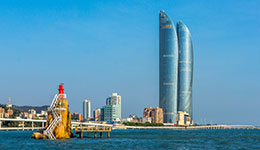
China opens its door wider – Liaoning Free Trade Zone
The establishment of the Liaoning Free Trade Zone (FTZ) was approved in September 2017 and since then, Dalian’s goal is to create a sufficient and stable business environment. The new FTZ will involve three major cities of Liaoning province, including Dalian, Shenyang and Yingkou. Dalian is already part of the Jinpu New Area, which helped to increase its international and domestic trade levels, including international partnerships with South Korea, Japan and Russia. Jinpu New Area is a strategic region for regional co-operation of firms in Northeast Asia. It was formed in 2014 and became the 10th of China’s Big National Districts as part of the 13th Five-Year Plan. The main aim of the Dalian Jinpu New Area is to develop the opening-up and reform of China, as well as to expand the coastal economic relationships in Liaoning Province and to boost the economic growth in the North-Eastern part of the country. The Jinpu New Area was approved by the State Council, in the hope of making Dalian a pilot zone for innovation. Since the formation of the New Area, large number of functional zones have been set up within the district. Some of these functional zones, include tariff-free zone, bonded port areas, national tourist resorts and export processing zones. The New Area helped Dalian to become a global logistics and international shipping centre. The New Area has both economic and geographical advantages for businesses, operating in Dalian and its surroundings. In 2017, the Chinese government approved the creation of the Liaoning Free Trade Zone. It is made up of three sectors, Dalian, Shenyang and Yingkou. The new Liaoning Free Trade Zone covers state-level high-tech zones, bonded harbour area, the Jinpu New District as well as numerous industrial parks. The regions that will have special customs supervision, will have a focus on the search for institutional innovation that can improve the accessibility of trade, logistics and the processing of bonded services. On the other hand, areas which are not under special customs supervision will focus on exploring potential reforms of the investment system, innovation of the finance sector, the promotion of transformation of the manufacturing industry as well as on the opening-up of the Chinese service industry. The government made registration convenient for companies, which are located at the Dalian Area of China, Liaoning Free Trade Zone, by setting up a special registration service window for organisations based in the Jinpu New Area and by helping companies to adopt a virtual registration service. Reports of the registration shows that half of the firms used the virtual registration mode to settle down in Jinpu New Area. These organisations include firms in the finance, trade, biological science, equipment manufacturing and port and shipping logistics industries. According to reports, Dalian has copied and promoted around 102 innovative measures of the Shanghai FTZ, as well as of other pilot Free Trade Zones. There are three main goals that the Chinese government tries to achieve by creating the Liaoning Free Trade Zone along with several new laws. The first, is to focus on speeding up the market-orientated institutional mechanism reforms. In order to do this, the Liaoning Free Trade Zone will mostly be based on the Shanghai Pilot Free Trade Zone and adapt new reforms and accomplish further institutional innovations, which are easily adaptable by the cities covered by the Liaoning Free Trade Zone. These changes should mainly focus on the function of the local government and expand the power of decentralization, improve services and to authorize supervision. These changes should help to improve the business environment and the restructuring and upgrading of industries in the involved areas. The second, is to focus equally on the introduction, development and show a new image in team building of talents. Introduction of new talents is important and should be done efficiently and high-level talents should be brought from global and international perspective. The involved are should improve the training and education and overall quality of cadres as well as to work hard, overcome difficulties and try to create a dynamic situation of competing for development. Lastly, the cities in the Liaoning Free Trade Zone should also open-up further to the outside world in order to help to build and achieve a new economic system. They should take part in the international competition and cooperate with other areas, but at the same time fully connect to the national “One Belt One Road” strategy. They should improve their trade systems, so that it meets common rules of international investment and trade, and look for new competitive advantages in foreign trade. Regions in the Liaoning Free Trade Zone can achieve development in its foreign trade system by enhance their technologies, investment attractions and intelligence attractions.
Longyan provincial congress representatives visit Pingtan
An investigation delegation composed of 20 representatives of the 12th Fujian provincial congress from Longyan paid a visit to Pingtan recently.During their visit, they toured around the places including Aoqian roll-on/roll-off passenger ship wharf, Aoqian Taiwan Town, Pingtan Comprehensive Pilot Zone Planning Pavilion and Beigang village.The New Silk Road Cross-border E-commerce Trading Center and Beigang village left them deep impression. They said two places have their own distinctive features. The former represents Pingtan's future development direction while the latter the rise of the city's traditional culture.After the field trip, the delegation highly affirmed the economic accomplishments that Pingtan has achieved over the recent years and offered their valuable suggestions concerning the city's development.
Lower capital requirements for foreign companies to use Fujian's name
According to the Fujian Industrial and Commercial Administration, foreign-funded companies with a registered capital of more than five million yuan ($784,500) are entitled to use the moniker "Fujian Province".The registration capital benchmark is three million yuan for Taiwan companies and foreign-backed enterprises in the province's development zones. It is one billion yuan for those in the Pingtan Comprehensive Pilot Zone, off Fujian's coast.
The investing advantages for Guangdong FTZ
Facilitating Trade At Guangzhou’s Nansha Bonded Port Area, Shenzhen’s Qianhai Bay Bonded Port Area and other areas with special customs supervision within the Pilot Free Trade Zone, entry and exit supervisory services will be carried out in line with “first line opening”, “highly efficient control in the second line”. In Zhuhai’s Hengqin Area, hierarchical management will run according to the principles “relaxed restriction in the first line, effective control in the second line, people and goods separated and systematic management” stipulated by the State Council. Goods coming into Guangzhou’s Nansha Bonded Port Area, Shenzhen’s Qianhai Bay Bonded Port Area or Zhuhai’s Hengqin Area (hereafter collectively referred to as the pilot zone) can be first brought in on the back of import manifests with the customs declaration formalities being dealt with in steps. Exported goods can first be declared at customs and then cleared at the port by customs. The storage and logistics of enterprises within the pilot zone are exempt from inspection and quarantine. A comprehensive management service platform for trans-departmental trade, transportation, processing, storage, and other operations will be established, creating a singular window for international trade. Facilitating Investment Overseas investment projects authorization (put on record), the examination and approval of establishment of foreign-invested enterprises and modification (put on record), the registration of establishment of commercial entities, organization code certificate, tax registration certificate (national tax, local tax), social security registration number, seal for the record and other matters can be handled by an “integrated service” mechanism. Gradually business license, organization code certificate, tax registration certificate, and so on, will be brought together into one single certificate using one single number. Financial Innovation Promote the cooperation and innovative development of cross-border renminbi business, and drive renminbi as the major currency for the Pilot Free Trade Zone and overseas cross-border large-amount trade as well as investment valuation and settlement. Explore to carry out cross-border investment and finance innovation business through free trade accounts and other risk controlled manners. Carry out pilot foreign exchange management reform with capital account convertibility, to promote the investment and finance exchange facilitation in the Pilot Free Trade Zone. Measures for Furthering Opening Up The Pilot Free Trade Zone further cancels or relaxes access restrictions for overseas investors, such as qualification requirements, equity ratio limit and business scope. There are 34 measures for opening wider to the whole world in six fields, namely manufacturing, financial service, maritime transport service, commercial trade service, professional service and technology, and cultural service; there are 28 measures for further opening up to Hong Kong and Macao in six fields, namely financial service, maritime transport service, commerce and trade service, professional service, technology and cultural service, and social public service. Tax Administration Tax policies which have been piloted in China (Shanghai) Pilot Free Trade Zone apply in China (Guangdong) Pilot Free Trade Zone in principle. Internal the Pilot Free Trade Zone, the scope of implementation in customs special supervision areas and the scope of application of tax policy remain unchanged. Consummate tax policies impose to overseas equity investment and offshore business development; consummate pilot tax refound policies impose to the port of departure; apply foreign tourists shopping and tax refound policy in eligible areas. Qianhai Shenzhen-Hong Kong Modern Service Industry Cooperation Zone of Shenzhen, Hengqin Area of Zhuhai levy 15% corporate income tax on eligible enterprises.
The investing advantages for Fujian FTZ
Convenience for Investment Simple Business registration: Business registration fully applies the service mode of "one declaration form, one window for all procedures, one license and code, one stamp needed for approval, one day end", the duration for business registration is shortened from the original 29 days to 1 day. Fewer procedures for foreign investment record: the pilot zone sets up the "one declaration form system" for foreign enterprises, which combines all the filling information needed by department of business, industry and commerce, quality testing and tax into one form, so that during business registration foreign enterprises could finish foreign investment record at the same time. Shorter period for project approval: for investment project, "one window for all procedures system" is implemented. The enterprise only needs to summit the application at one window of the comprehensive service hall, and then the application materials will be delivered to backstage departments of business reform and development, land, planning, environmental protection to go through joint approval. Within this system, the number of application materials reduce from 250 to about 19, and project approval term shortens from average 1 year to less than 93 working days. Foreign Investment Admission The pilot zone implements a national treatment plus a negative list management model for foreign investment prior to entry, and a record system for those outside the negative list. At present, the list of prohibited foreign investment under simplifying has only 122 rules, the industries available for foreign investment has looser restrictions than other areas in China. Efficient customs clearance Learning from Singapore's experience, Fujian Free Trade Zone builds the "single window" network system in China's forefront of international trade. The import trade declaration data only needs to be entered on a window of network, and then it will be transferred to the port supervision department of customs, inspection and quarantine, maritime affairs, border defense, so as to finish the customs clearance procedures. Finacial Innovation Many innovative practices can be seen on international financial business such as cross-border RMB business, interest rate liberalization, foreign exchange management system and cross-strait security business cooperation, which makes the international financing more convenient and channels broader.
The New Free Trade Zones Explained, Part IV: Fujian
In this last part of the Free Trade Zone series, we concentrate on the Fujian FTZ, which mainly aims to strengthen the province’s cooperation and economic ties with Taiwan and further open up its financial sector for foreign investment. The beneficial policies that stimulate integration with Taiwan offer interesting opportunities for foreign investors that also have a presence there.Geographic ScopeThe Fujian FTZ covers an area of 118.04 square kilometers and consists of the three following, pre-existing development zones:Pingtan Area (43 square kilometers) Major industries: tourism, trade and investmentXiamen (43,78 square kilometers, including Xiangyu Bonded Zone and Xiamen Haicang Bonded Port) Major focus: China-Taiwan regional financial services and regional aviationFuzhou (31.26 square kilometers, including Fuzhou Bonded Zone, Export Processing Zone and Fuzhou Bonded Port) Major industries: advanced manufacturing, aviation and professional servicesSimplified Establishment and Customs Clearance ProceduresThe Fujian FTZ will be the first one to implement the “one-form application” system, which allows enterprises to simply fill in an application form online to set up a company. All the investor then has to do is pick up the business license. This is a very significant streamlining of the company set-up process.The zone will implement simplified customs clearance procedures exclusively for goods imported from and produced in Taiwan. The pre-entry customs inspection and quarantine for imported goods from Taiwan will be cancelled, except for prohibited and restricted goods including dangerous chemicals. The import approval procedures will be simplified for Taiwanese-made health products, cosmetics, medical devices and Chinese traditional medicine. Further, motor vehicles with Taiwanese license plates may enter Pingtan freely with a temporary license plate, issued by local police.Investment and Trade Liberalization between China and TaiwanTaiwanese investors are allowed to engage in crop selection and production of crop seeds (except GM products) with a Chinese controlling party. This industry is otherwise listed as prohibited on the FTZ Negative List.

Please leave us a message and we will get back to you shortly.

If you want to learn more information about investing in China, please leave your email address, we will send you the relevant information and article every month.
 0086-10-53270173
0086-10-53270173 china@tanikawa.com
china@tanikawa.com











